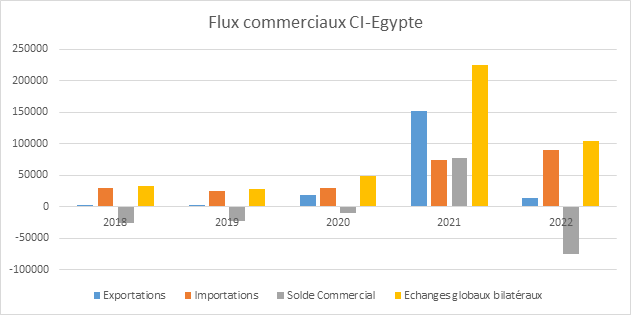Continent: Africa
Official name: Arab Republic of Egypt
Nature of regime: Presidential
Head of State: Abdel Fattah Al Sissi
Area: 1,002,000km2
Currency: Egyptian pound
Population (2022): 106.2 million inhabitants
Capital: Cairo Main cities: Alexandria, Port Said, Assiut, Luxor, Aswan
Official language: Arabic
Agreements and Conventions
At the bilateral level, the two (02) countries have excellent relations and have signed several agreements governing these relations:
- Air Transport Agreement, signed at Abidjan on November 25, 1968;
- Agreement on cultural, scientific and technical cooperation, signed on January 15, 1985;
- Agreement on cultural, scientific and technical cooperation, signed on January 15, 1985;
- Cultural and Technical Cooperation Agreement signed on January 21, 1985, and the instruments of ratification were exchanged in May 1986;
- Treaty of Amity and Cooperation signed on January 15, 1985 and ratified in 1987;
- Trade Agreement signed on February 25, 1998;
- Agreement establishing a Joint Cooperation Commission on March 7, 1998;
- Technical Cooperation Agreement between the Governments of Egypt and Cote d’Ivoire, signed by the two (02) Ministers of Foreign Affairs in Abidjan, on March 7, 1998;
- Technical Cooperation Agreement, known as the "Fund", signed in Abidjan on March 7, 1998;
- Memorandum of Understanding on Health and Pharmaceutical Production, July 27, 2002;
- Memorandum of Understanding and Cooperation which was signed on March 26, 2009, between the two (02) Civil Aviation authorities;
- Three (03) cooperation agreements in the fields of health, culture, information and communication technologies were signed in Abidjan on April 11, 2019.
It should be noted that the first session of the Ivorian-Egyptian Joint Cooperation Commission was held in Abidjan on March 6 and 7, 1998.
On this occasion, 14 draft agreements in the fields of transport, culture, infrastructure, tourism, trade, industry, fisheries, customs, administration and health were examined and should be finalized during the second Joint Grand Commission to be held in Egypt, but which has not yet been held.
In addition, Cote d’Ivoire benefits from most of the training organized by the Egyptian Fund for Technical Cooperation in Africa, particularly in the areas of agriculture, media, communication and information technology, nursing and diplomatic training.
In 2009, the Egyptian fund provided a donation of medicines and medical equipment of three (03) tons to Cote d’Ivoire.
As part of Egypt's scholarship and internship program, many Ivorians participate in vocational training courses or university studies in Egypt in the fields of security and counter-terrorism, communication, agriculture, health, trade, industry and learning the Arabic language.
A. The main products exported are: machinery and appliances, wood, charcoal and articles of wood, articles of cast iron, iron, steel.
B. The main imported products are: essential oils, perfumery or toiletries prepared and prepared, plastics and articles.
|
Trade flows Cote d’Ivoire-Egypt (Value in millions of CFAF) |
|||||
|
Years |
2018 |
2019 |
2020 |
2021 |
2022 |
|
Exports |
3099 |
3323 |
19450 |
151677 |
14400 |
|
Imports |
29489 |
25205 |
29212 |
73892 |
89800 |
|
Trade balance |
-26390 |
-21882 |
-9762 |
77785 |
-75400 |
|
Global bilateral exchanges |
32588 |
28528 |
48662 |
225569 |
104200 |
Sources : DGE-DPPSE

Sources : (General Directorate of Economy) DGE-DPCEI (Department of Promotion and International Economic Cooperation)
- The value of bilateral trade reached 104.2 billion of CFAF in 2022, compared to 225.569 billion of CFAF in 2021.
- Over the period 2018-2022, the average value of Ivorian exports is estimated at 38.39 billion of CFAF / year against 49.52 billion of CFAF / year for imports.
- Over the period 2018-2020, and in 2022, the trade balance is in deficit for Cote d’Ivoire and surplus in 2021.

